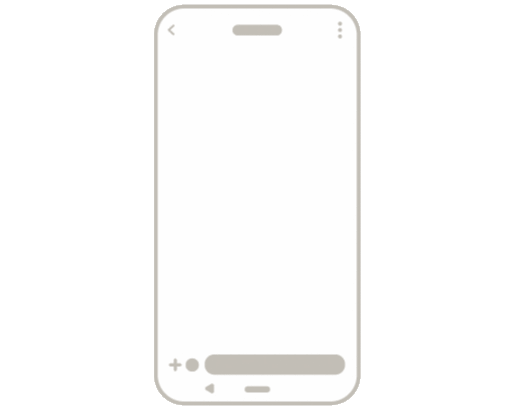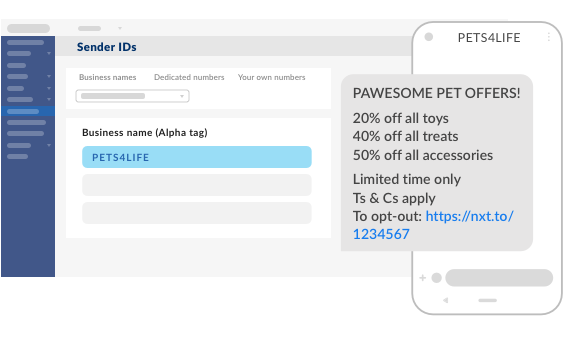Share article:
How to choose the right SMS sender ID in Australia

Using a sender ID is an effective way to enhance communication with your customers, as well as build trust and loyalty. Choosing the right type to suit your business’ needs, however, can be a complex decision to make.
We will break down what each type of sender ID is in Australia, their benefits and drawbacks, as well as share some tips on how to align these to your use cases. And, if you’re a visual learner, refer to our handy infographic to tie it all together.
Do you need two-way SMS or one-way SMS
Before we get started, let’s cover off the two major differences when it comes to choosing a sender ID. These functionalities can make or break your decision, so it’s best to consider this first.
Two-way SMS
This feature means recipients can text you back to form a conversation – learn more about it here. It’s best used for:
- Appointment confirmations and reminders
- Customer service
- Employee communications
- SMS surveys
- Promotional offers (with a call-to-action)
One-way SMS
This means you can send an SMS, but you can’t receive one back. It suits the following use cases best:
- Promotional offers (without a call-to-action)
- Two-factor authentication
- Updates & alerts


Ask yourself, is it important that recipients can text you back? An alternate way to look at this would be: do you want to send a letter with a return address, or a branded flyer?
Recommended reading: Build good customer relationships easily with 2-way SMS
What are the different types of Sender IDs?
There are three main types in Australia:
- Virtual mobile numbers (dedicated or shared), which are 2-way
- Alphanumeric tags, which are 1-way
- Physical numbers, also known as ‘spoofing’
Now, let’s dive into the details.
What is a dedicated virtual mobile number?
While these look like normal mobile numbers (for example, +61 123 456 789), they are very useful for those who need to send text messages as a unified business. Once you assign a dedicated number, multiple people in your company can jump in and use it. This means you remain consistent with your recipients, and they’ll know where to reach you.
TOP TIP: Dedicated virtual mobile numbers are 10-digits long and often referred to as long codes. Some countries also support 4, 5 or 6-digit short codes.
The difference between long codes and short codes
A short code is a special 5 or 6 digit telephone number that’s shorter than a full phone number (normally 10 digits). Short codes are used to send and receive SMS and MMS messages to and from mobile phones. MessageMedia currently offers short codes in the US and New Zealand.
If you’re in Australia, short codes exist, however they come with high costs and compliance requirements, which has led to the popularity of free to text Virtual Mobile Numbers (dedicated numbers) as the shortcode alternative.
We do not currently offer short codes in Australia but do have plenty of 10-digit dedicated numbers to choose from. These are low cost, your recipients in Australia can reply for free, and they are available to you immediately to lease through our web portal.
Benefits of dedicated numbers
Opt-out texts:
Contacts can reply STOP to opt-out of hearing from you. You can customise this trigger to whatever keyword you prefer, such as CANCEL or END. People can also opt back in (i.e. text START to re-subscribe). Alternatively, you can send an opt-out link.
Single threads:
Messaging history will be stored on your recipient’s phone, which makes it easier for them to refer back to your conversation or get back in touch with you. And, because you are using a consistent mobile number, they will be able to save you as a contact.
Text-in option:
You won’t need to initiate the first text message when you have a dedicated mobile number. This is especially helpful for customer service and support teams, as well as text-in competitions.
Keyword triggers and automations:
Since virtual numbers enable two-way messaging, you can set up auto-replies in our online portal. This will save you time and resources, simplify your workstreams, and give you a fluid tone-of-voice.
Recommended reading: Examples of Automated Text Messages
In Australia, a standard dedicated mobile number will cost around $29 per month. If you’re after a number that is more ‘attractive’ or easier to remember, it may cost a bit more.
What is a virtual shared numbers pool?
While these appear similar to a dedicated phone number, there are a few key differences. Outbound messages will be sent from a rotary of numbers in our portal. While you can still benefit from two-way messaging features, such as keyword opt-outs, you’ll miss out on consistency.
Limitations of a shared numbers pool
Non-threaded:
Because you are using a different mobile number each time, each conversation will start a new SMS chain. This can clutter your recipient’s inbox and may confuse them when they want to refer back to a conversation.
No text-in option:
You will need to instigate conversations with your contacts, as your number will change. This means you won’t be able to receive unsolicited inbound messages; in other words, you’ll need to make the first move.
If these features are not a necessity, then a virtual shared number may suit you. These are available in all of our subscription bundles at no extra cost.
What is an SMS alpha tag?
Also known as an alphanumeric sender ID, alpha tags are made up of 3-11 letters and/or numbers. Alpha tags must be registered and approved before sending, and must have clear relevancy to your business and/or use case.
Sending messages from your brand name is particularly ideal for SMS marketing and two-factor authentication, as it increases recognition and trust. There are, however, a few considerations to be aware of.

Details about sending with an alpha tag
One-way messaging:
You can send outbound messages in high volumes, but you will not be able to receive replies from your recipients.
Link opt-outs only:
While you won’t be able to set up opt-out automations, you can still remain compliant by sending a link to an opt-out page.
Country limitations:
Not all countries support alpha tags. For instance, messages cannot be sent to the US, Canada or New Zealand.
If your focus is on brand awareness or building trust, an alpha tag could be your solution. They are available at no extra cost in any of our subscription bundles.
Recommended reading: Send SMS from a name rather than a number
What is an SMS physical number?
A physical number means your own mobile number is set as the sender ID within our portal. You can start a conversation with a customer through our state of the art gateway, then you can pick up the rest of that conversation on your phone. This functionality is always available.
Top tip: This type of sender ID is also referred to as ‘spoofing’. This should not be confused with ‘smishing’ in this context.
[SMS Sender ID Infographic]

So, should you send SMS from a company name or a virtual number? It really depends on your business needs and what you plan to use SMS for. For more guidance, get in touch with one of our experts.
